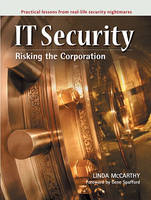
IT Security
Prentice Hall (Verlag)
978-0-13-101112-0 (ISBN)
- Titel ist leider vergriffen;
keine Neuauflage - Artikel merken
Security is more about people and policies than about techie details. Linda McCarthy's IT Security: Crimes and Misdemeanors gives you more than the title promises. It is not only a collection of enlightening case studies based on real security audits, but the author also gives a brief and to-the-point analysis of the real risks in the way systems are installed, configured, supported and managed. The book deliberately does not go into technical details, so anyone who is interested in network security will find it easy to read. Discusses and documents the importance of a security policy, the impact of organizational politics, and includes actual transcripts of break-ins and checklists of preventive security measures. It won't come as news to IT pros that cybercrime is soaring. But a new slate of stats reveals just how bad the situation really is. Research firm Computer Economics predicts computer crime will more than double this year while virus incidents are expected to increase by 22 percent.
Linda McCarthy has worked with UNIX for over a decade, focusing primarily on security administration, hardware architecture, product development, and key management (encryption) technology. She lead a worldwide security research and development team at Sun Microsystems. She has also taught several courses at Sun, including classes in hardware architecture, system administration, and UNIX security. As part of her research Linda, has broken into thousands of systems on corporate intranets, often while posing as a new clerical worker at the company. She currently is a security consultant.
Foreword.
Acknowledgments.
About the Author.
Introduction.
1. Responding to Attacks.
Incident-Response Nightmare. Day 1: Unauthorized Access. Day 2: Problem Fixed. Day 3: Security Is Breached Again. Days 4 to 7: Escalating the Incident. Day 8: Too Late to Gain Evidence. Day 9: Who Was the Bad Guy? Summary: Attacks from the Inside. Let's Not Go There… Focus on Prevention. Prepare for the Worst. React Quickly and Decisively. Follow Up. Checklist. Final Words.
2. Out-of-the-Box Security.
Deal with Security Later. Day 1: False Sense of Security. Two Years Later: Noticed the Attack. + Two Weeks: The Hacker's Back. + Three Weeks: Fixing Security. The Saga Continues: The Network Remains at Risk. Summary: Would You Hire This ISP? Let's Not Go There… Know Your Risks. Avoid Out-of-the-Box Installations. Test Your Network. Know the People Who Know Your Data. Assign or Acquire Adequate Funding for Security. Don't Export Read/Write Permissions to the World. Remove Old Accounts. Test Passwords. Apply Security Patches. Follow Policies and Procedures. Work with Experts. Use Training. Checklist. Final Words.
3. Executive Support.
Executive Commitment. Day 1: Unsecured Systems. A Year Later: Unauthorized Access Continues. Summary: Take an Active Approach. Let's Not Go There… Commit to Security from the Top Down. Don't Delegate Security. Keep Levels of Management to a Minimum. Report Back to Executive Management. Set Security as a Corporate Goal. Provide or Take Training as Required. Make Sure That All Managers Understand Security. Communicate to Management Clearly. Checklist. Final Words.
4. Network Access.
Partner Connections. Day 1: Security Architecture. A Few Weeks Later: Security Installation Policy. The Next Day: Who's Responsible for Security. Over the Next 29 Days: A Hacker Gains Control. + One Month: An Unscheduled Security Test. Audit Day 1: Network Maps Tell a Lot. Audit Day 2: Unenforced Policies. The Last Audit Day: Taking Responsibility for Security. Summary: Keep the Competition Out. Let's Not Go There... Use Standard Architecture Designs. Track External Connections. Take Responsibility for Your Territory. Require Approval for External Connections. Enforce Policies and Procedures. Disable Unnecessary Services. Stress the Importance of Training. Follow Through. Don't Connect Unsecured Systems to the Internet. Checklist. Final Words.
5. Security Training.
Overlooking Training. Initial Contact: Security Testing. Day 1: Gathering Facts. Day 2: Testing the Systems. Day 3: Leaving Security Training out of the Budget. Summary: Make Sure You Fund Training. Let's Not Go There... Educate Executive Management. Protect the Security Training Budget. Make Security a Management Requirement. Make Training a System Administrator Requirement. Attend Security Seminars. Have Brown-Bag Lunches. Disseminate Security Information. Join Security Lists. Write White Papers. Write for Newsletters. Develop Tools into Products. Checklist. Final Words.
6. Unplanned Security.
Transition Plan. Day 1: Testing Security. Understanding Risk. Phase One: Physical Security. Phase Two: Getting Past Physical Controls. Phase Three: Unauthorized Access. Day 2: Personal Information at Risk. Summary: Plan Outsourcing Carefully. Let's Not Go There... Assess Risks. Classify Systems. Forbid Out-of-the-Box Installations. Don't Be Too Trusting. Learn from the Past. Target Budget Cuts. Conduct Security Testing. Hold Management Accountable. Don't Set Yourself Up. Include Training in Budgets. Keep Score. Checklist. Final Words.
7. Maintaining Security.
Responsible for Security. Day 1: Keeping The Bad Guys Out. Day 2: Firewall Administrator. Temporary Security. Management and Security. Being Serious about Supporting Security. My Last Day: Attitudes Can Tell A Lot. Summary: Ask Not What Your Company's Security Can Do for You. Let's Not Go There... Define Roles and Responsibilities. Develop Firewall Policies and Procedures. Feed Your Firewall. Read Your Audit Logs. Use Detection Software. Respond Quickly! Require Proof of Security. Conduct Audits. Get Educated. Checklist. Final Words.
8. Internal Network Security.
Unsafe Network. In the Beginning: Bypassing the Corporate Network. Day 1: Collecting Evidence. Day 2: System Administrators Versus the Security Team. Who Owns Security. Transferring Responsibility. Summary: Security Is the Casualty of War. Let's Not Go There… Put Someone in Charge of Policies and Procedures. Delineate Cross-Organizational Security Support. Don't Wait for Miracles. Question Processes. Know When to Cry “Uncle”. Be Responsible. Checklist. Final Words.
9. Outsourcing Security.
Forget Security? Day 1: Taking a Look at Security Controls. Day 2: Network Connections. Amazing Security Mistakes. Untrained and Inexperienced Support. Days 3 and 4: Does Management Understand? Summary: Outsourced Systems Must Be Secured. Let's Not Go There… Conduct Security Assessments. Do It Right. Do It Regularly. Fix the Problems You Find. Don't Use the Sink-or-Swim Approach. Checklist. Final Words.
10. Unsecure Email.
Email or See Mail? Personal Data Accessed. Summary: You Have the Right to Waive Your Right to Privacy. Let's Not Go There... Use Encryption! Encourage Your Company to Encrypt. Add Encryption to Your Security Budget. Watch for Other Email Hazards. Final Words.
11. Looking Back: What's Next?
Risking the Corporation. Legal Duties to Protect Information and Networks. Business Initiatives and Corporate Goals. Threats Require Action.
12. A Hacker's Walk Through the Network.
A Hacker's Profile. The Real Hackers. About Those Tools. Walking with the Hacker. What the Hacker Was Doing…
Conclusion.
Appendix A. People and Products to Know.
Acronyms.
Glossary.
Index.
| Erscheint lt. Verlag | 4.3.2003 |
|---|---|
| Verlagsort | Upper Saddle River |
| Sprache | englisch |
| Maße | 180 x 236 mm |
| Gewicht | 540 g |
| Themenwelt | Informatik ► Netzwerke ► Sicherheit / Firewall |
| Informatik ► Theorie / Studium ► Kryptologie | |
| ISBN-10 | 0-13-101112-X / 013101112X |
| ISBN-13 | 978-0-13-101112-0 / 9780131011120 |
| Zustand | Neuware |
| Haben Sie eine Frage zum Produkt? |
aus dem Bereich


